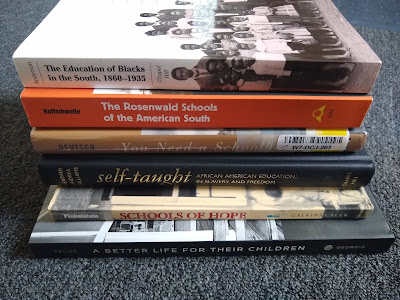I’ve added some books to my bookshelf, y’all!
 |
| My recent acquisitions. |
Here’s the list:
- A Better Life for Their Children: Julius Rosenwald, Booker T. Washington, and the 4,978 Schools That Changed America, by Andrew Feiler
- Schools of Hope: How Julius Rosenwald Helped Change African American Education, by Norman H. Finkelstein
- Self-Taught: African American Education in Slavery and Freedom, by Heather Andrea Williams
- The Education of Blacks in the South, 1860-1935, by James D. Anderson
- The Rosenwald Schools of the American South, by Mary S. Hoffschwelle
- You Need a Schoolhouse: Booker T. Washington, Julius Rosenwald, and the Building of Schools for the Segregated South, by Stephanie Deutsch
Clearly, I’m taking a look at education! If you been paying attention to my posts about the Scott siblings - the brothers and sisters of my 2x-great-grandmother Scoatney (Scott) Cooper - you can probably guess why. Scoatney’s brother Sydney Borden Scott attended not only attended Atlanta Baptist College (later Morehouse University), graduating from the Academic Course in 1898 and the College Course in 1901, he went on to attend Meharry Medical College from 1906-1908 and graduated from the University of Illinois College of Physicians and Surgeons in 1910. He also taught and was Principal at the East Athens School in Athens, GA in the 1903-1904 school year, and, if he is one and the same as Ananius Scott (more on that here), he was also a school teacher in an Atlanta school for some spell of time as well. And that’s just Borden!
Scoatney’s sister Lula (Scott) Crew attended Spelman Seminary, graduating in 1902. She then became a schoolteacher, teaching in Georgia towns like Redan, Conyers, and Lithonia (where she was principal) from 1902 until her death in 1936. She also sought continuing education through summer school sessions at Morehouse. Her daughter Beuna Nell Crew followed in her footsteps, attending Spelman from 1933 to 1938 and then becoming a teacher in Monroe, GA and specifically a biology teacher at Fairmont High School in Griffin, GA. Like her mother, she also sought continuing education, taking classes at Atlanta University. Meanwhile, Beuna’s brother Lamar Crew attended Atlanta University’s Laboratory High School and graduated in 1935. While there, he earned a semester scholarship to Morehouse, though it doesn’t appear that he continued on. And Scoatney, Borden, and Lula’s brother John William Scott is listed as a teacher in Hancock County, GA in the 1900 federal census!
I am so curious to know how these siblings ended up on their educational paths, particularly given their parents had been enslaved. I know, broadly, that education – especially literacy – was desperately craved and worked hard towards for many of the formerly enslaved, but what were the specific educational offerings open to the Scott siblings in Georgia when they were kids (and perhaps to their parents as adults)? How did those educational offerings lay the groundwork for attendance at Spelman Seminary and Atlanta Baptist College in Atlanta, coming from the much more rural Hancock County?
That’s what I’m hoping Heather Andrea Williams’ and James D. Anderson’s books will begin to tell me, providing context that I can build upon with additional research. (I’ve also found this site, which provides very brief overviews of Hancock County, GA schools, and I plan to use it as another point of exploration: https://georgiagenealogy.org/hancock2/schools.html) Supplemented by a few other books on my shelf, like Under the Guardianship of the Nation: The Freedmen’s Bureau and the Reconstruction of Georgia, 1865-1870, by Paul A. Cimbala, I should get some useful contextual information.
The other four books on my list all focus on the Rosenwald Schools, a network of around 5,000 schools in the South supported by Jewish philanthropist (and Sears, Roebuck and Company president) Julius Rosenwald, in close relationship with Booker T. Washington. I’m interested in this because, in 1928, Lula that writes to Spelman that she is “now raising money to build a Rosenwald school, here at my home” in her community of Lithonia, GA. A year and a half later, she notes, “I’ve a future vision of building a Rosenwald School here. We have already raised some money in that direction.” What would that process have looked like? What did it take to get one off the ground? And are there Rosenwald archives that might contain material related to her efforts? I want to know!
I’ve already finished Schools of Hope and have started on Self-Taught. We’ll see what I can accomplish over Winter Break (I have so much time to get things done!). I’m hoping I’ll be able to write with more concrete information on these topics in the future, so stay tuned.
* * *
Do you know anything about education opportunities for Black children and adults in Hancock County in the 1870s, '80s and '90s? Drop me a note – I’d love to hear from you!


No comments:
Post a Comment